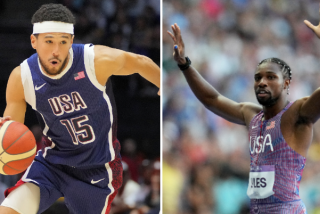Becker Runs Away--Briefly--From No. 1 : Australian Open: It takes a few minutes of introspection to assimilate finally reaching a goal.
- Share via
MELBOURNE, Australia — In their moments of triumph, champions sometimes cry or shout or hug their loved ones. Boris Becker ran away.
Introspective, sensitive, an artist in his own way, Becker fled the stadium and crowd and a defeated Ivan Lendl seconds after the final shot at the Australian Open on Sunday to be alone with his thoughts.
This was not just another victory and paycheck for Becker, even if his 1-6, 6-4, 6-4, 6-4 victory gave him a fifth Grand Slam title and $250,000.
This was about becoming No. 1 in the world rankings, displacing Stefan Edberg, achieving at 23 the most important goal of his seven-year pro career and perhaps moving on with life away from tennis.
He jogged through a tunnel in the stadium, past bewildered officials, to the grassy park outside, pumping his arms in the air and exulting among the Chinese elm trees under a canopy of fluffy white clouds.
“He was on top of the world. He was ecstatic,” said Glen Sharam, head groundsman at the National Tennis Center, who was told by the referee to follow that redhead.
“Keep away,” Becker shouted, and Sharam, a professional sprinter, stayed a respectful 70 yards behind.
Becker loped up the jogging path on Batman Avenue, then picked up speed, running hard, clearing out his lungs and his mind. He ran back just as hard before slowing down in the park on the way back into the stadium. A half-dozen people in the park watched him go by and applauded him, then he disappeared again into the tunnel.
“I just couldn’t sit down and relax. I had to move,” Becker said. “There was so much going on inside me. I just had to get out there to be by myself. I was thinking back about the past, how many years I have been (playing), that I am finally on the top. I was thinking backwards what I had to go through.”
It seemed so long ago that he startled the sports world by winning the first of his three Wimbledon titles at 17 in 1985. He reached the No. 2 ranking the next year, but then slipped to No. 4 in 1987 and 1988. He rededicated himself to his goal, working harder than ever under the guidance of manager Ion Tiriac and Coach Bob Brett and captured the U.S. Open in 1989. But still the No. 1 spot eluded him.
He had never finished better than the quarters in five previous appearances in Australia, but he came here five weeks ago to concentrate on winning. He lost in the first rounds of two tuneup events and almost gave up hope of winning in this country or getting to the top.
He barely survived a five-set, third-round match against No. 45 Omar Camporese--at 5 hours 11 minutes the longest in Australian history--and found himself, along with other players and fans, worried and preoccupied about the war in the Persian Gulf and the threat of terrorism.
The irony of achieving his life’s goal in this unlikely setting did not escape Becker.
Ten minutes after taking off on his solitary gallop, Becker returned to center court, the crowd of 15,000 and the phalanx of photographers. He accepted his silver trophy but was too choked up to say much.
“It’s unbelievable for me at this moment,” he said. He couldn’t express himself, so he merely thanked everybody, then retreated to the locker room.
More to Read
Go beyond the scoreboard
Get the latest on L.A.'s teams in the daily Sports Report newsletter.
You may occasionally receive promotional content from the Los Angeles Times.










